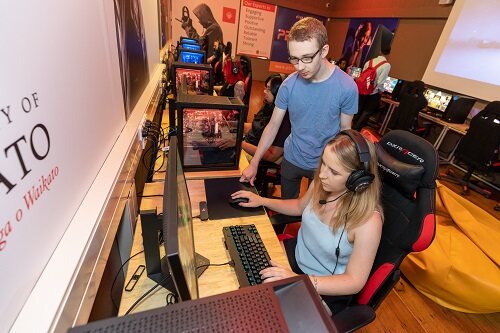With three out of every four New Zealanders now involved in video gaming, the University of Waikato has launched New Zealand’s first Esports minor qualification and is taking enrolments for 2022.


Waikato is one of only a handful of universities around the world offering the minor that will provide students an overview of the Esports industry, a business expected to turn over $US1 billion this year and the world’s fastest growing sport.
Tom Featonby, Esports coordinator at the University, says the minor builds on the University’s OMEN Esport Area, launched in 2019, the University positioning itself as an Esport industry leader.
“It is such an exciting and rapidly growing industry. We also know it is where most of our secondary students are, so it’s helping to bring a connection between something they are passionate about and higher learning.”
The minor, made up of four papers, covers topics from the training and performance of elite gamers through to Esports production and broadcasting and will enable students to bring that understanding to their chosen profession.
There are three pathways for studying Esports including, ‘Athletes and Coaching’, ‘Industry, Events and Management’, and ‘Design, Media, and Production’. Students can take the minor to explore innovations in the Esports industry and learn how they can take these innovations into their chosen career.
Professor Holly Thorpe, a sociologist in Te Huataki Waiora School of Health at the University, and Associate Professor Gareth Schott, a media psychologist and digital gaming expert, have been instrumental in helping to develop the qualification.
Professor Thorpe says the Covid-19 pandemic has changed the role of digital technology in people’s lives and as a result gaming has soared.
“The research tells us three out of every four New Zealanders are now involved in video gaming and Esports is a version of that. We already have huge national Esports events being run by the University for secondary students. Offering the minor is the next evolution of that,” says Professor Thorpe.
She says the stereotypes of teenagers locked away in darkened rooms were outdated and instead it was time to recognise the incredible skill and talent needed to succeed in Esports, with professional athletes bringing in millions of dollars.
The minor was designed to give students a good overview of the industry and students taking it would be able to implement the learnings into their careers in a variety of ways.
“A student might be taking a Bachelor of Teaching so it might help them think about how they can implement Esports into the classroom through the gamification of learning or how they can use digital games to get kids excited about physical education again. The possibilities to take learnings and innovation from the Esports industry to other sectors are endless,” says Professor Thorpe.
The University would eventually like to develop the subject into a major, but for now Professor Thorpe says it is exciting to be the first in New Zealand to offer students the chance to study the subject.
“We know this is their domain and their language and if we can meet our secondary students in this space, it’s a place for really constructive dialogue. Learning from a place of passion and exploring interdisciplinary innovations in Esports, our students can go on to be real leaders and change makers in their chosen careers”



































